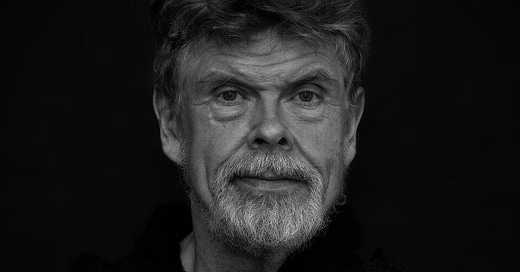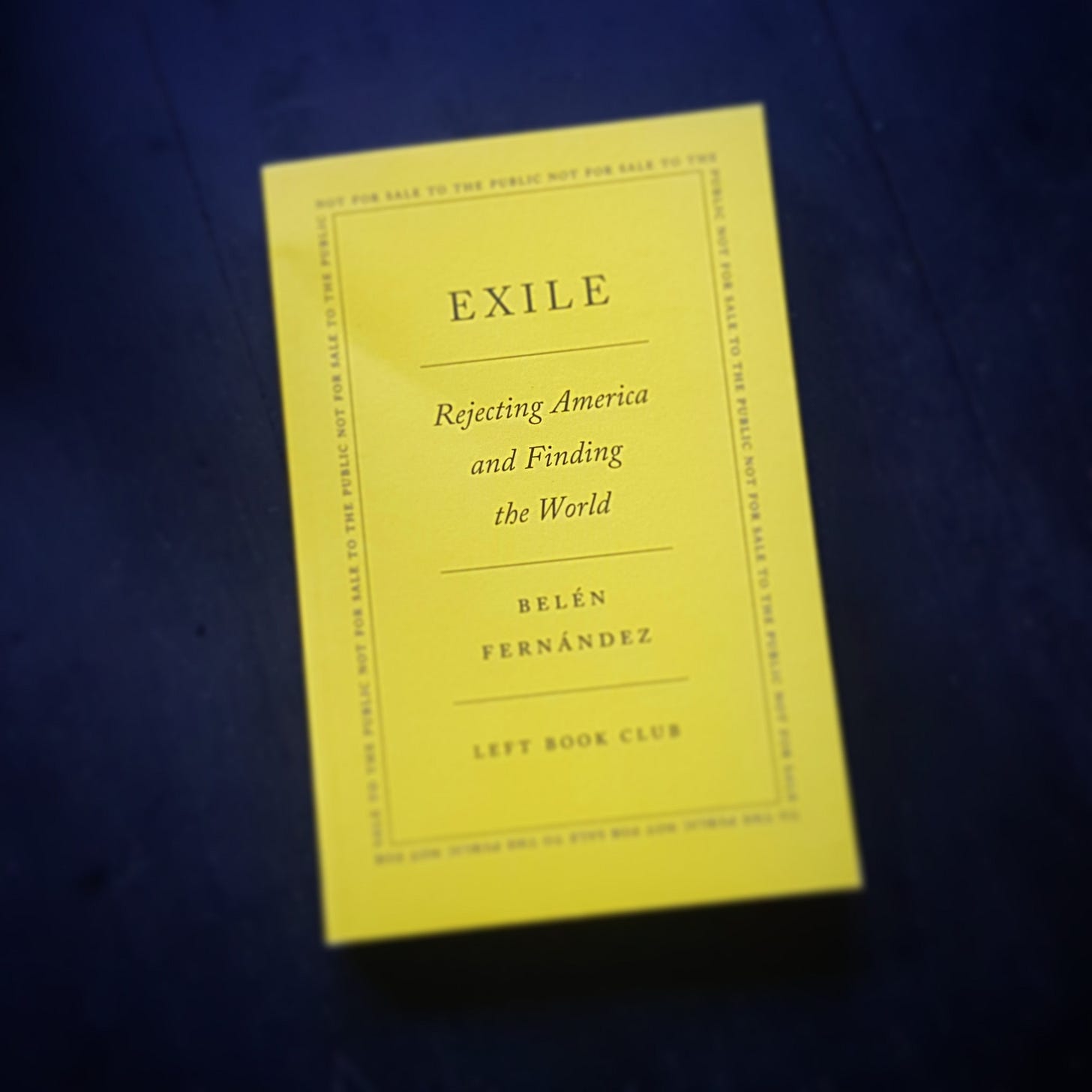Episode 3: David Lee Morgan - Revolution
From the Seattle anti-war protests of the 60s and 70s to the squats of punk-era Christiania and Berlin, radical poet David Lee Morgan has lived a life immersed in revolutionary ideas.
Episode 3 of Strange Exiles was a conversation with radical poet David Lee Morgan.
David has long been one of my favourite writers. From his brilliant and provocative poetry to the white-hot intensity and ambitious grand narratives he crafts in his electric one-man shows, he is perhaps the best example I know of a true revolutionary poet.
More than this, he’s a renaissance man, with vast knowledge of left-wing and radical history and politics, musical theatre and Greek tragedy, philosophy, urban planning, and the underground countercultures of the last five decades (to name just a few of his many strings).
Getting a chance to hear his life story was an immense privilege, and very timely, what with the release of Trial of the Chicago Seven, and Judas and the Black Messiah, which look at the ‘Yippie’ movement and the Black Panther leader Fred Hampton. Both movies are pretty excellent, and worth a watch after listening to David’s story.
Listening back to this conversation also made for some interesting comparisons with the story of Chairman Mao’s wife Jiang Qing, in the latest Adam Curtis documentary ‘Can’t Get You Out Of My Head’. I’ll stand behind recommending that for a ton of reasons, maybe I’ll go into them at some point here on the blog - suffice to say we love Adam Curtis and you should watch all of his films.
David and I have had lengthy conversations before about Maoism and communism generally, and while we disagree about a lot of things, we find common ground on many more. I wanted to hear the story of how he arrived at his ideas and beliefs about the world, and the story was fascinating.
He’s lived through the cultural moments of seismic shifts like the Vietnam War, the Cultural Revolution and the Paris communes of ‘68, in the same way that my generation lived through the Iraq wars, the banking crash of ‘08, and Covid-19. It’s fascinating to listen to him give the insiders’ view of what it felt like to be alive in those times.
Strange Exiles, so far, has not been a place where I’ve declared my own politics or philosophy explicitly. Maybe I’ll do that in a future episode. But I certainly come to the table with a great deal of sympathy for and identification with the ideas, analysis and goals of communism, and anarchism… tempered with a healthy skepticism about ideologies in general, and dogma in particular. But I’m not a shock jock or a news anchor - the podcast is a place to listen to and explore ideas beyond my own worldview, not to argue over who’s wrong or right about a particular issue or idea.
I hope you’ll listen to David’s story in the same spirit. His work, whether through its intensity or the depth of its enquiry, transcends both ideology and politics. It gets to the heart of the revolutionary impulse, which is to break chains, free minds, and run towards a better world… sometimes, whatever the cost.
My revolution: Poems and book recommendations from David Lee Morgan
American soldiers push helicopters into the sea, following their defeat in Saigon and the subsequent evacuation in 1975.
First and foremost David is a poet, and he’s kindly given me permission to publish a few of his verses here. Let’s kick off with a poem that references the funniest part of Episode 3, the busking stories.
The Rules for Busking in the London Underground
(back in the days of Thatchereagan)
The first rule, of course, is there are no rules, there are never any rules.
The second rule is that the first rule is bullshit, there’s always rules, especially when there’s no rules.
The third rule is that the first one who gets there starts playing, if someone else comes by, they get the next hour, if someone else comes by you start a list, an hour per person, a duo gets two hours, but no group gets more than two hours, in theory, although who’a gonna argue with four speed freaks who have a better idea on Saturday night? Morning pitches last till 10:30, no matter what time you start, except for Green Park and Oxford Circus, which last until 11:30, although every now and then you come across someone who doesn’t know that and thinks you are cheating them. Then you have to be assertive.
Rule number four is never let anyone bully you out of your pitch.
Rule number five is if someone comes along with a shopping cart full of plastic shopping bags and reaches into one of them to pull out a carpenter’s clawhammer and starts pounding it into the wall, sending sparks flying and gouging out chunks of concrete, and if he is screaming, “I’ll kill for this pitch, I’ll die for this pitch,” rule number five says: give him the pitch.
Rule number six: you don’t have to be good, you just have to be determined.
(The golden rule for busking not only in London, by the way, but worldwide is never ask permission – it just gives them a chance to say no.)
Rule number seven: the more illegal it is the better it pays.
Now let’s get on to his recommendations for reading. A lot of these cover the subjects we discussed in the first part of the interview, like the anti-Vietnam War protests in Seattle. This HistoryLink essay from 2000 will help with David’s timeline of events and protests in the late 60s and early 70s, so it’s a good place to start if you want to get some context.
The next link is to the papers issued by the Revolutionary Communist Party and the Revolutionary Union prior to the RCP’s split in 1977 / 1978. These contain a lot of the thinking and ideas of David’s great inspiration, Bob Avakian, and ranges from thoughts on organising revolution, to women’s liberation and feminism, and even the return of capitalism in the Soviet Union.
Avakian would make many key contributions, including this lengthy essay from 1981 on the future of revolutionary politics. As David puts it:
“This is the document that marked the qualitative leap from Marxist-Leninist-Maoist to a new synthesis that summed up the mistakes and successes of the first wave of revolutions and building on that, went beyond.”
Bob Avakian’s essay ‘The New Communism: The science, the strategy, the leadership for an actual revolution, and a radically new society on the road to real emancipation’ is another essential read, as is his New year’s statement ‘A New Year, The Urgent Need For A Radically New World – For The Emancipation Of All Humanity’.
Now, let’s do a quick run down of the books David mentioned, I’m sure some of these will be familiar, others perhaps less so.
Albert Camus - The Myth of Sisyphus is one of the classic existential texts, and I’m sure we’ll revisit it again with future guests.
Alan Watts - The Taboo Against Knowing Who You Are is a new one on me, although I’ve listened to a few Alan Watts lectures on YouTube, so I think this is the first recommendation I’m going to dive into. If you’ve got any other Alan Watts recommendations, let us know in the comments!
David recommends a couple of key communist and Marxist texts, starting with Lenin - Imperialism, The Highest Stage of Capitalism, The State and Revolution, and What is to be Done. Both of those links will take you to the full text. The same site also has reference copies of the full texts of some of the writing of Mao Zedong.
David describes Louis Althusser as “the bridge between ‘academic Marxism’ and Maoism,” and recommends his seminal work Lenin and Philosophy as an accompaniment to the above texts.
He also mentions a key 1960s text, Regis DeBray - Revolution in the Revolution?, which covers some of the stuff we touched on about revolutions in Central and Latin America. It’s a book that influenced the violent Weather Underground movement, an approach David explored but ultimately rejected.
Also from the 1960s, there are some texts by Black Panther members that are essential reading for any revolutionary, or revolutionary-in-waiting. Penguin has a collected volume called The Huey P. Newton Reader, and you can listen to some of Fred Hampton’s key speeches on Spotify and other platforms. There are several biographies of key Black Panthers which are easy to find, but if anyone has a better source for speeches and essays from the time, please feel free to share them.
David didn’t have any specific recommendations for Alain Badiou, and his is not a section of the philosophy library I have explored, outside the works of other writers. So with hesitation I’m going to post a link to an essay I haven’t read yet which claims to offer a crash course in Badiou as a starting point. If it’s rubbish, or you have a better suggestion for where to start with Badiou, let us know!
David also briefly touched on a lecture he delivered at an international symposium on ‘The New Communism’ - I haven’t found a link to that specific conference, but the book about the 2009 conference also features Slavoj Žižek, and looks really interesting. It’s over here (sorry for the Amzn link).
That’s it for the book recommendations! Let’s close this section with a poem from David about the Coronavirus…
CORONARANT
The virus is real
The danger is real
The need for isolation is real
More deadly than the average flu
But a lot less lethal than SARS or Ebola
Corona is the perfect mix of innocence and murderYes, fight the billionaire bailouts
Yes, fight the fascist controls, creeping in
Hidden under a viral cloud
But denying reality
Does not make the fight stronger
Denying reality doesn’t work
Because reality bites back
It always bites back
You know why?
Because it’s reality
Did you think we could rape the earth for 200 years
And there would be no consequences?
The virus is the earth biting backFuck your 5g conspiracies
Fuck your lizard fantasies
And fuck your anti-vax, anti-science bullshit
Yes, there are conspiracies
Yes, there are conspirators
But they are not lizards
They are not Illuminati
And they are not fucking gods
They are mean little bastards
Who have money and power
They are riding on top
Riding on the back of the tiger
But guess what
They are not the tiger
They are terrified of the tiger
You know why?
Because we are the tiger
We are the dumb beast that carries them
It is our ignorance that gives them powerIn the days of slavery
The penalty for learning to read was death
Nowadays
The penalty for not learning to read is death
And not just our own personal demise
But the end of our entire civilisation
Maybe the end of all human lifeScience
Is about learning to read
How do things move?
How do they change?
How do we grab hold of the complex contradictions
That make up the modern world
And channel them in the direction of human liberation?
Fairy tales about evil wizards
However true they may be
Are not enough
Worse
They blind us to the reality underneath
The virus
Is a tiny little beast
But armed with ignorance
It can take down tigers
Learn to read
Strange Exiles loves… The Left Book Club
Once in a while, I’ll use the newsletter to let you know about great stuff I’ve found knocking about the internet, and this time it’s The Left Book Club.
For a little over a fiver, they’ll send a new book of essays to your door every month. It’s a great wee project, and the first one I read, by Belén Fernández, was a real eye-opener about the situation in Syria, Lebanon and Palestine, immaculately referenced and researched, but also written in a dry, compelling style. I can’t recommend this highly enough if they’re all going to be as good as the first one!
For the same price, they’ll even send you a second book each month, featuring some of the key left-wing texts of the past 200 years.
Coming up on Episode 4: Joshua Ellis
The next episode is crazy.
My guest is writer, journalist and futurist Joshua Ellis. We talked about the nightmares concealed beneath the gleaming hood of the American Dream, and what it means for the future now that these American Nightmares are roaming in feral packs in broad daylight.
Josh is a Pulitzer-nominated journalist who writes about climate collapse, inequality and injustice, and the grim Mad Max future we are all destined to inherit. I spoke to him back in November 2020 and asked him to predict the US Election. No spoilers, but he pretty much called it play by play.
Come back to this post in a few days for a link to a preview of the next episode, or follow us on Soundcloud to hear it there first. In the meantime, here is where you’ll find us:
Subscribe at sptfy.com/strangeexiles
Follow @strangeexiles for updates
All subscribe links anchor.fm/strangeexiles
Take care of each other.
Bram E Gieben, Glasgow, February 2021







